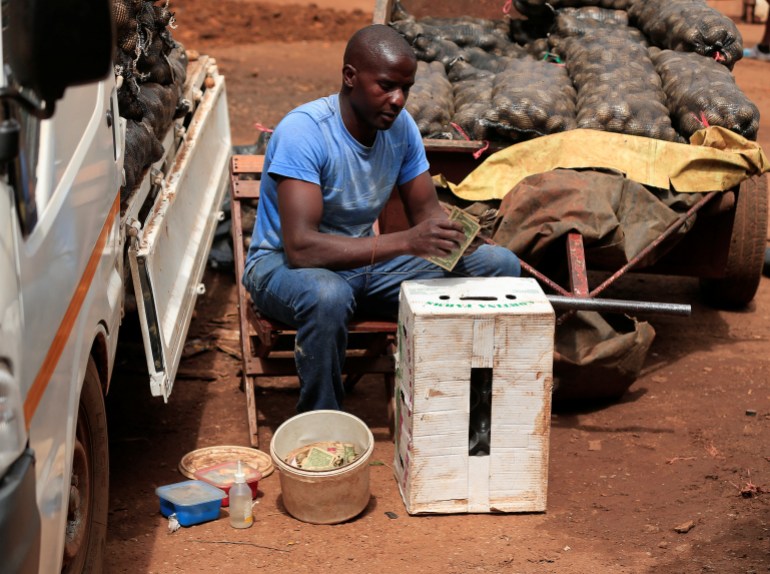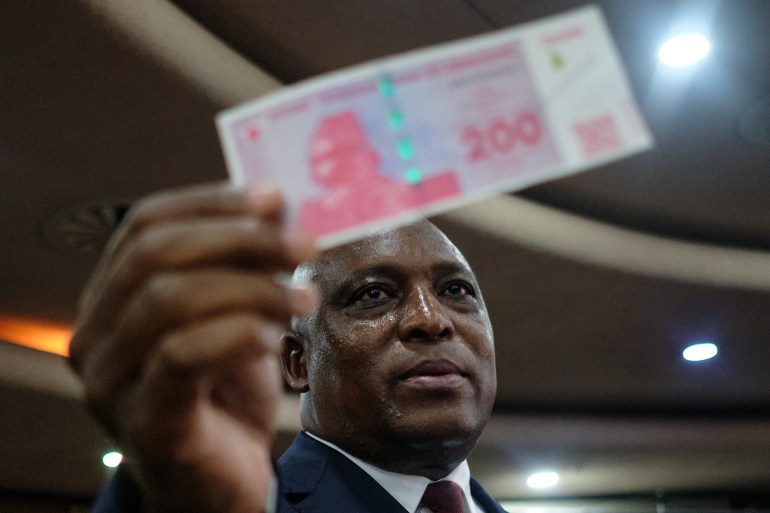Harare, Zimbabwe – The entrance to the main gate of Budiriro Mall, a busy mall south of Zimbabwe’s capital Harare, was once a hive of activity where informal currency traders had set up makeshift “offices” on the sidewalk.
The area is now almost deserted.
The smartly dressed boys and middle-aged men who secretly traded foreign currency with buyers have not set foot there for weeks to avoid police raids.
In Zimbabwe, hit by a decades-long economic crisis marked by hyperinflation, a 54 percent unemployment rate and highly volatile local currencies, the more stable U.S. dollar is the preferred medium of exchange.
From government utilities to street vendors, everyone accepts payments in US dollars. Because of the dollar’s popularity, black market forex trading is a thriving sideline where thousands earn a living.
As part of the government’s latest attempt to stabilize the economy, Zimbabwe’s central bank introduced a new currency in April: Zimbabwe Gold, or ZiG.
Soon after, Zimbabwean police began cracking down on informal currency traders, arresting them in large numbers. The authorities blame illegal foreign exchange trading for the distortion of the exchange rate and the devaluation of the national currency and want to ensure that the ZiG is accepted and does not quickly lose value like its predecessor.
More than 70 foreign exchange traders have been arrested so far. But instead of containing them, it has driven them underground and into more creative ways of doing business.
Forex trader Darlington Murazva* worked in a small shop about a kilometer from his previous headquarters in the Budiriro shopping center.
The burly 30-year-old was scrolling through the WhatsApp messaging app on his Samsung smartphone and pressed play on a voice memo that came into a group chat he was participating in with other currency traders and sellers.
“The police are in Glen View right now. “They didn’t find anyone,” the voice said.
Murazva, who has been a foreign exchange trader for 11 years and operates largely informally, used to have a strategic spot at the mall’s entrance, where he would sit on a plastic stool and watch for passing shoppers.
When the police raids began, he and the other traders fled. They are now stationed all over Harare – and inform each other about the police’s actions.
“Now the police can’t find us. We’re always two steps ahead,” he said with a wry smile.
“Thanks to our dealer colleagues in the area, we know where they are in real time.”
Opportunities full of possibilities
The largest sources of foreign exchange in Zimbabwe are diaspora remittances and exports. Zimbabwe allows its citizens to open USD accounts where they can deposit or receive greenback. You can also withdraw hard USD notes from banks. Companies can also obtain foreign exchange through the official auction market.
However, away from official channels, people regularly buy and sell USD to informal Forex traders as needed. Since street vendors offer better and more market-oriented exchange rates, Zimbabweans prefer to deal with them rather than banks or official exchange offices.
Black market trading is illegal, so the exact number of dealers is unknown. But it is assumed that there are a few thousand. The WhatsApp group Murazva belongs to has 247 members.
Although the dealers are usually in competition with each other, they have put aside their rivalries to join forces and help each other avoid arrest.
Recent reports that went viral on social media that 60 arrested dealers were sentenced to three years in prison have also caused nervousness in an already uneasy community.

Moving online was not only a security measure for merchants, but also a new way for some to continue their business.
Steven Tambudze*, 40, who has been a foreign exchange trader for almost half his life, said WhatsApp has been a real blessing in recent weeks.
“Although this has been a very difficult time for other traders, business has been very good for me,” Tambudze told Al Jazeera at the Highglen cross-border bus station, where he was waiting for a customer.
“Most of my deals now come via WhatsApp,” he said.
Some of his former customers, whom he had lost track of because they had started dealing with other traders in the city, had also returned, he said, explaining that people in the raids preferred to deal with someone who they know and trust, and can now contact them directly via phone and messaging app.
Tambudze said he never meets random people and only works with clients he knows personally.
Murazva also uses WhatsApp to continue working. However, he is cautious. He never mentions the word ZiG in an actual phone call and never talks about exchange rates or anything that might identify him as a trader for fear that the authorities would overhear.
When he receives a call, he encourages potential customers to chat with him on WhatsApp, which he trusts a little more because of its end-to-end encryption.
“You can never give security a day off,” he told Al Jazeera.

“We’re staying afloat”
On the street, Forex traders all have their own methods of approaching customers. At the mall, Murazva sat on his plastic chair at the entrance until he spotted a potential customer. Then he approached the passer-by in a hushed voice and, in a whisper, made a deal to exchange dollars for the local currency or vice versa.
Customers now use WhatsApp to contact a merchant they know when looking for currencies. The trader then posts a message in the WhatsApp group telling the other traders that they would like to carry out a currency exchange.
Other interested dealers will contact you via email with an offer and a price will be agreed upon.
From there, payment in local currency is made electronically via a bank account and a physical meeting is arranged to collect the cash in US dollars.
The traders in the group are a community that knows each other and therefore enjoys a certain level of trust.
Other retailers also use WhatsApp’s broadcast function, which allows users to send a single message to multiple recipients at the same time with one click.
The recipients of a shipment cannot see each other, which ensures privacy. This comes in handy for Forex traders who are trying to lay low and still make a little income.
“The transfers also help a lot and are much more convenient because you can reach multiple dealers,” Tambudze said.
Murazva is grateful to messaging apps for helping traders make a living despite the turmoil.
“Without WhatsApp groups we would have starved. We’re keeping our heads above water,” he said.
The experienced trader believes the police attack is a temporary phase.
He said this was because police launched a similar raid when the central bank introduced the bonds, a currency that is part of the Zimbabwe dollar, in 2016.
“The police operation is not new. We are used to them. Whenever they introduce currency, we are arrested,” Murazva said. “But they will stop soon.”
Bridging measures
The new ZiG currency is already depreciating against the US dollar. So far, the currency has lost up to 25 percent of its value on the black market and is trading at Zig20:USD1. Officially the rate is Zig13.5:USD1.
Harare-based economic analyst Rashwhit Mukundu said the rapid devaluation showed a lack of confidence in the local currency.
However, the authorities blame black market currency traders for the downfall of ZiG and the collapse of its predecessor. They say traders are paying far more than what is offered at the official rate, driving the currency lower as it loses value against the US dollar.
Informal traders reject the idea that it is their own fault.
Meanwhile, economists and critics accuse the central bank of flooding the market with local currency, which is then used to buy U.S. dollars from street currency dealers. Local government contractors, who are typically paid in local currency—that’s billions in banknotes—then exchange those notes for U.S. dollars on the black market, creating an oversupply that fuels inflation.
“The real challenge in this economy is the lack of confidence in the local currency because people have lost their savings and capital to hyperinflation in the past,” said Gift Mugano, visiting professor of economics at the University of Zimbabwe Business School.

He told Al Jazeera that arresting foreign exchange traders was a stopgap measure to deal with the currency crisis, but not a smart idea.
“The question is: How do we restore trust? You don’t arrest people to increase trust. “The moment you force people, you lose perspective,” he said.
For Mugano, the action is a sign that the authorities have simply “run out of ideas” on how to deal with the currency problem.
“The black market is still thriving. The government refuses to use its own money to pay for passports, fuel and other services,” he said.
Mukundu, meanwhile, said the police action was an exercise in futility.
“It’s about sewing up the butt to stop diarrhea. “The Zimbabwean government and central bank are not addressing the fundamental issue of lack of trust in the Zimbabwean currency,” he told Al Jazeera.
For Mukundu, past experiences with inflation and ongoing economic crises make people want to hold on to the US dollar and other stronger currencies rather than their own.
“Zimbabweans now see value and wisdom in storing economic value in foreign currencies,” he said. “It is a culture and economic system built over the years that supports the storage of value in such currencies.”
*Name changed for privacy reasons.
